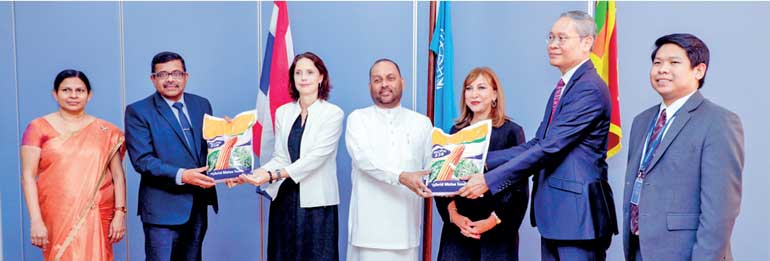Monday Feb 23, 2026
Monday Feb 23, 2026
Wednesday, 23 November 2022 00:00 - - {{hitsCtrl.values.hits}}

The Thai Ambassador to Sri Lanka Poj Harnpol (right) hands over the maize seeds to Agriculture Minister Mahinda Amaraweera in the presence of United Nations Resident Coordinator Hanaa Singer-Hamdy, and UNDP Deputy Resident Representative Malin Herwig along with representatives from humanitarian partner organisations
The Royal Thai Embassy in Colombo is supporting the procurement of a portion of the country’s maize seed requirements working together with the United Nations Development Program (UNDP).
The initiative is aimed at addressing the looming shortage of grains for the animal feed industry and maize based food items due to the ongoing socio-economic crisis in Sri Lanka, as a part of the response efforts through the United Nations (UN) joint Humanitarian Needs and Priorities (HNP) Plan.
In addition to the livestock feed industry, maize is a staple input for food items such as Thriposha and Samaposha, for which the demand for seeds has swelled over recent years.
The UN has since June been responding to the crisis through its joint HNP, which was recently revised to target the provision of life-saving assistance for 3.4 million Sri Lankans, and extended through the end of December.
Foreign exchange shortages, and reduced household purchasing power, exacerbated by two consecutive seasons of poor harvests, have triggered a dramatic increase in food insecurity. Twenty-eight per cent of the population – or 6.3 million people – face moderate-to-severe acute food insecurity. The Royal Thai Embassy recognised the immediate need to import Maize seeds and supplement the requirement for the Maha harvest season.
Highlighting the role of the Government of Thailand in contributing towards food security needs, Ambassador Poj Harnpol said: “Thailand supports the concerted efforts of the UN programmes to maintain sustainable livelihoods of the affected Sri Lankans. This contribution is one of the packages of Thailand’s donation to Sri Lanka including medicines, medical supplies, food, and financial support from both the Government sectors as well as people’s sectors from Thailand.”
The procurement of Maize seeds will supplement ongoing overall food security efforts working with farmer organisations in the dry zone districts of Sri Lanka.
Agriculture Minister Mahinda Amaraweera said: “We are grateful to the Royal Kingdom of Thailand, for their generous support, for providing 14.5 Metric Tons of hybrid seeds, which is sufficient for 2900 farmers, at this crucial time. This will help to strengthen the bilateral relationship, between Thailand and Sri Lanka. My sincere appreciation to UNDP, for speeding up the procurement, and purchasing seeds, within a short period.”
United Nations Resident Coordinator Hanaa Singer-Hamdy said: "The HNP emergency appeal is structured in a way that allows us to work closely with the Government of Sri Lanka, international financial institutions, humanitarian partners and donors to streamline efforts and ensure support reaches those who need it most. The Thai Government’s generous maize donation comes at a crucial time as Sri Lanka approaches the end of the Maha planting season. It also aligns with our focus on supporting production for a sustainable recovery, since it will boost feedstock for the poultry industry, which is a key source of high-quality protein for vulnerable populations.”
UNDP Deputy Resident Representative Malin Herwig said: “Through sustainable efforts such as this intervention to boost food production, the need of the hour can be addressed to reduce the risk of food insecurity for vulnerable farmers, who are now empowered to continue their livelihoods while not solely relying on handouts alone. We look forward to working closely with the Government of Thailand in the timely supply of Maize to resource poor farmers in the Dry Zone that are especially vulnerable due to the socio-economic crisis, to look beyond towards critical development efforts.”